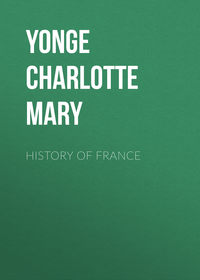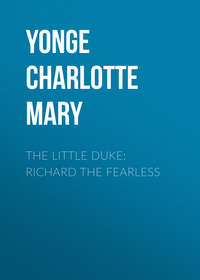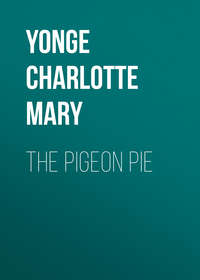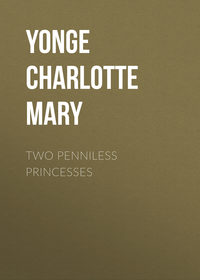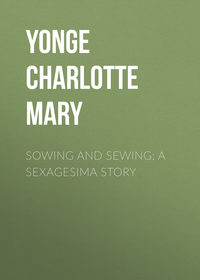
Hopes and Fears or, scenes from the life of a spinster
‘Let me see,’ quoth the gentleman, bending over with an air of intimacy.
‘You may see,’ returned Lucilla, ‘but that will do no good. Owen got this at a little shop at Elverslope, and we can only conclude that the father of orange pigs is dead, for we’ve tried every maker, and can’t hit off the tint.’
‘I’ve seen it in a shop in the Strand,’ he said, with an air of depreciation, such as set both ladies off with an ardour inexplicable to mere spectators, both vehemently defending the peculiarity of their favourite hue, and little personalities passing, exceedingly diverting apparently to both parties, but which vexed Honora and dismayed Phœbe by the coolness of the gentleman, and the ease with which he was treated by the ladies.
Luncheon was announced in the midst, and in the dining-room they found Miss Charteris, a dark, aquiline beauty, of highly-coloured complexion, such as permitted the glowing hues of dress and ornament in which she delighted, and large languid dark eyes of Oriental appearance.
In the scarlet and gold net confining her sable locks, her ponderous earrings, her massive chains and bracelets, and gorgeous silk, she was a splendid ornament at the head of the table; but she looked sleepily out from under her black-fringed eyelids, turned over the carving as a matter of course to Owen, and evidently regarded the two young ladies as bound to take all trouble off her hands in talking, arranging, or settling what she should do with herself or her carriage.
‘Lolly shall take you there,’ or ‘Lolly shall call for that,’ passed between the cousins without the smallest reference to Lolly herself (otherwise Eloïsa), who looked serenely indifferent through all the plans proposed for her, only once exerting her will sufficiently to say, ‘Very well, Rashe, dear, you’ll tell the coachman—only don’t forget that I must go to Storr and Mortimer’s.’
Honora expressed a hope that Lucilla would come with her party to the Exhibition, and was not pleased that Mr. Calthorp exclaimed that there was another plan.
‘No, no, Mr. Calthorp, I never said any such thing!’
‘Miss Charteris, is not that a little too strong?’
‘You told me of the Dorking,’ cried Lucilla, ‘and you said you would not miss the sight for anything; but I never said you should have it.’
Rashe meanwhile clapped her hands with exultation, and there was a regular chatter of eager voices—‘I should like to know how you would get the hackles out of a suburban poultry fancier.’
‘Out of him?—no, out of his best Dorking. Priced at £120 last exhibition—two years old—wouldn’t take £200 for him now.’
‘You don’t mean that you’ve seen him?’
‘Hurrah!’ Lucilla opened a paper, and waved triumphantly five of the long tippet-plumes of chanticleer.
‘You don’t mean—’
‘Mean! I more than mean! Didn’t you tell us that you had been to see the old party on business, and had spied the hackles walking about in his yard?’
‘And I had hoped to introduce you.’
‘As if we needed that! No, no. Rashe, and I started off at six o’clock this morning, to shake off the remains of the ball, rode down to Brompton, and did our work. No, it was not like the macaw business, I declare. The old gentleman held the bird for us himself, and I promised him a dried salmon.’
‘Well, I had flattered myself—it was an unfair advantage, Miss Sandbrook.’
‘Not in the least. Had you gone, it would have cast a general clumsiness over the whole transaction, and not left the worthy old owner half so well satisfied. I believe you had so little originality as to expect to engage him in conversation while I captured the bird; but once was enough of that.’
Phœbe could not help asking what was meant; and it was explained that, while a call was being made on a certain old lady with a blue and yellow macaw, Lucilla had contrived to abstract the prime glory of the creature’s tail—a blue feather lined with yellow—an irresistible charm to a fisherwoman. But here even the tranquil Eloïsa murmured that Cilly must never do so again when she went out with her.
‘No, Lolly, indeed I won’t. I prefer honesty, I assure you, except when it is too commonplace. I’ll meddle with nothing at Madame Sonnini’s this afternoon.’
‘Then you cannot come with us?’
‘Why, you see, Honor, here have Rashe and I been appointed band-masters, Lord Chamberlains, masters of the ceremonies, major-domos, and I don’t know what, to all the Castle Blanch concern; and as Rashe neither knows nor cares about music, I’ve got all that on my hands; and I must take Lolly to look on while I manage the programme.’
‘Are you too busy to find a day to spend with us at St. Wulstan’s?’
A discussion of engagements took place, apparently at the rate of five per day; but Mrs. Charteris interposed an invitation to dinner for the next evening, including Robert; and farther it appeared that all the three were expected to take part in the Castle Blanch festivities. Lolly had evidently been told of them as settled certainties among the guests, and Lucilla, Owen, and Rashe vied with each other in declaring that they had imagined Honor to have brought Phœbe to London with no other intent, and that all was fixed for the ladies to sleep at Castle Blanch the night before, and Robert Fulmort to come down in the morning by train.
Nothing could have been farther from Honora’s predilections than such gaieties, but Phœbe’s eyes were growing round with eagerness, and there would be unkindness in denying her the pleasure, as well as churlishness in disappointing Lucy and Owen, who had reckoned on her in so gratifying a manner. Without decidedly accepting or refusing, she let the talk go on.
‘Miss Fulmort,’ said Ratia, ‘I hope you are not too religious to dance.’
Much surprised, Phœbe made some reply in the negative.
‘Oh, I forgot, that’s not your sisters’ line; but I thought . . . ’ and she gave an expressive glance to indicate Miss Charlecote.
‘Oh, no,’ again said Phœbe, decidedly.
‘Yes, I understand. Never mind, I ought to have remembered; but when people are gone in, one is apt to forget whether they think “promiscuous dancing” immoral or praiseworthy. Well, you must know some of my brother’s constituents are alarmingly excellent—fat, suburban, and retired; and we have hatched a juvenile hay-making, where they may eat and flirt without detriment to decided piety; and when they go off, we dress for a second instalment for an evening party.’
To Phœbe it sounded like opening Paradise, and she listened anxiously for the decision; but nothing appeared certain except the morrow’s dinner, and that Lucilla was to come to spend the Sunday at Miss Charlecote’s; and this being fixed, the luncheon party broke up, with such pretty bright affection on Lucilla’s part, such merry coaxing of Honor, and such orders to Phœbe to ‘catch that Robin to-morrow,’ that there was no room left for the sense of disappointment that no rational word had passed.
‘Where?’ asked Owen, getting into the carriage.
‘Henry knows—the Royal Academy.’
‘Ha! no alteration in consequence of the invitation? no finery required? you must not carry Hiltonbury philosophy too far.’
‘I have not accepted it.’
‘That is not required; it is your fate, Phœbe; why don’t you speak, or are you under an embargo from any of the wicked enchanters? Even if so, you might be got off among the pious juveniles.’
‘Papa was so kind as to say I might go wherever Miss Charlecote liked,’ said Phœbe; ‘but, indeed, I had rather do exactly what suits her; I dare say the morning party will suit her best—’
‘The oily popular preachers!’
‘Thank you, Owen,’ laughed Honor.
‘No, now you must accept the whole. There’s room to give the preachers a wide berth, even should they insist on “concluding with prayer,” and it will be a pretty sight. They have the Guards’ band coming.’
‘I never heard a military band,’ ejaculated Phœbe.
‘And there are to be sports for the village children, I believe,’ added Owen; ‘besides, you will like to meet some of the lions—the Archdeacon and his wife will be there.’
‘But how can I think of filling up Mrs. Charteris’s house, without the least acquaintance?’
‘Honey-sweet philosopher, Eloïsa heeds as little how her house is filled, so it be filled, as Jessica did her father’s ring. Five dresses a day, with accoutrements to match, and for the rest she is sublimely indifferent. Fortune played her a cruel trick in preventing her from being born a fair sultana.’
‘Not to be a Mahometan?’ said Phœbe.
‘I don’t imagine she is far removed from one;’ then, as Phœbe’s horror made her look like Maria, he added—‘don’t mean that she was not bred a Christian, but the Oriental mind never distinctly embraces tenets contrary to its constitution.’
‘Miss Charlecote, is he talking in earnest?’
‘I hope not,’ Honora said, a little severely, ‘for he would be giving a grievous account of the poor lady’s faith—’
‘Faith! no, my dear, she has not reflection enough for faith. All that enters into the Eastern female mind is a little observance.’
‘And you are not going to lead Phœbe to believe that you think it indifferent whether those observances be Christian or Pagan?’ said Honora, earnestly.
There was a little pause, and then Owen rather hesitatingly said—‘It is a hard thing to pronounce that three-fifths of one’s fellow-creatures are on the high road to Erebus, especially when ethnologically we find that certain aspects of doctrine never have approved themselves to certain races, and that climate is stronger than creed. Am I not talking Fennimorically, Phœbe?’
‘Much more Fennimorically than I wish her to hear, or you to speak,’ said Honora; ‘you talk as if there were no such thing as truth.’
‘Ah! now comes the question of subjective and objective, and I was as innocent as possible of any intention of plunging into such a sea, or bringing those furrows into your forehead, dear Honor! See what it is to talk to you and Miss Fennimore’s pupil. All things, human and divine, have arisen out of my simple endeavour to show you that you must come to Castle Blanch, the planners of the feast having so ordained, and it being good for all parties, due from the fairy godmother to the third princess, and seriously giving Cilly another chance of returning within the bounds of discretion.’
Honora thought as much. She hoped that Robert would by that time have assumed his right to plead with Lucilla, and that in such a case she should be a welcome refuge, and Phœbe still more indispensable; so her lips opened in a yielding smile, and Phœbe thanked her rapturously, vague hopes of Robert’s bliss adding zest to the anticipation of the lifting of the curtain which hid the world of brightness.
‘There’s still time,’ said Owen, with his hand on the check-string; ‘which do you patronize? Redmayne or—’
‘Nonsense,’ smiled Honor, ‘we can’t waste our escort upon women’s work.’
‘Ladies never want a gentleman more than when their taste is to be directed.’
‘He is afraid to trust us, Phœbe.’
‘Conscience has spoken,’ said Owen; ‘she knows how she would go and disguise herself in an old dowager’s gown to try to look like sixty!’
‘As for silk gowns—’
‘I positively forbid it,’ he cried, cutting her short; ‘it is five years old!’
‘A reason why I should not have another too grand to wear out.’
‘And you never ought to have had it. Phœbe, it was bought when Lucy was seventeen, on purpose to look as if she was of a fit age for a wall-flower, and so well has the poor thing done its duty, that Lucy hears herself designated as the pretty girl who belongs to the violet and white! If she had known that was coming after her, I won’t answer for the consequence.’
‘If it does annoy Lucy—we do not so often go out together—don’t, Owen, I never said it was to be now, I am bent on Landseer.’
‘But I said so,’ returned Owen, ‘for Miss Charlecote regards the distressed dressmakers—four dresses—think of the fingers that must ache over them.’
‘Well, he does what he pleases,’ sighed Honor; ‘there’s no help for it, you see, Phœbe. Shall you dislike looking on?’ For she doubted whether Phœbe had been provided with means for her equipment, and might not require delay and correspondence but the frank answer was, ‘Thank you, I shall be glad of the opportunity. Papa told me I might fit myself out in case of need.’
‘And suppose we are too late for the Exhibition.’
‘I never bought a dress before,’ quoth Phœbe.
Owen laughed. ‘That’s right, Phœbe! Be strong-minded and original enough to own that some decorations surpass “Raffaelles, Correggios, and stuff”—’
‘No,’ said Phœbe, simply, and with no affectation of scorn, ‘they only interest me more at this moment.’
Honor smiled to Owen her love for the honesty that never spoke for effect, nor took what it believed it ought to feel, for what it really felt. Withal, Owen gained his purpose, and conducted the two ladies into one of the great shops of ladies apparel.
Phœbe followed Miss Charlecote with eyes of lively anticipation. Miss Fennimore had taught her to be real when she could not be philosophical, and scruples as to the ‘vain pomp and glory of the world’ had not presented themselves; she only found herself admitted to privileges hitherto so jealously withheld as to endow them with a factitious value, and in a scene of real beauty. The textures, patterns, and tints were, as Owen observed, such as approved themselves to the æsthetic sense, the miniature embroidery of the brocades was absolute art, and no contemptible taste was displayed in the apparently fortuitous yet really elaborate groupings of rich and delicate hues, fine folds, or ponderous draperies.
‘Far from it,’ said Honor; ‘the only doubt is whether such be a worthy application of æsthetics. Were they not given us for better uses?’
‘To diffuse the widest amount of happiness?’
‘That is one purpose.’
‘And a fair woman well dressed is the sight most delightful to the greatest number of beholders.’
Honor made a playful face of utter repudiation of the maxim, but meeting him on his own ground emphasized ‘Fair and well dressed—that is, appropriately.’
‘That is what brings me here, said Owen, turning round, as the changeful silks, already asked for, were laid on the counter before them.
It was an amusing shopping. The gentleman’s object was to direct the taste of both ladies, but his success was not the same. Honora’s first affections fell upon a handsome black, enlivened by beautiful blue flowers in the flounces; but her tyrant scouted it as a ‘dingy dowager,’ and overruled her into choosing a delicate lavender, insisting that if it were less durable, so much the better for her friends, and domineering over the black lace accompaniments with a solemn tenderness that made her warn him in a whisper that people were taking her for his ancient bride, thus making him some degrees more drolly attentive; settling her head-gear with the lady of the shop, without reference to her. After all, it was very charming to be so affectionately made a fool of, and it was better for her children as well as due to the house of Charlecote that she should not be a dowdy country cousin.
Meantime, Phœbe stood by amused, admiring, assisting, but not at all bewildered. Miss Fennimore had impressed the maxim; ‘Always know what you mean to do, and do it.’ She had never chosen a dress before, but that did not hinder her from having a mind and knowing it; she had a reply for each silk that Owen suggested, and the moment her turn came, she desired to see a green glacé. In vain he exclaimed, and drew his favourites in front of her, in vain appealed to Miss Charlecote and the shopman; she laughed him off, took but a moment to reject each proffered green which did not please her, and in as brief a space had recognized the true delicate pale tint of ocean. It was one that few complexions could have borne, but their connoisseur, with one glance from it to her fresh cheek, owned her right, though much depended on the garniture, and he again brought forward his beloved lilac, insinuating that he should regard her selection of it as a personal attention. No; she laughed, and said she had made up her mind and would not change; and while he was presiding over Honora’s black lace, she was beforehand with him, and her bill was being made out for her white muslin worked mantle, white bonnet with a tuft of lady grass, white evening dress, and wreath of lilies of the valley.
‘Green and white, forsaken quite,’ was the best revenge that occurred to him, and Miss Charlecote declared herself ashamed that the old lady’s dress had caused so much more fuss than the young lady’s.
It was of course too late for the Exhibition, so they applied themselves to further shopping, until Owen had come to the farthest point whence he could conveniently walk back to dine with his cousins, and go with them to the opera, and he expended some vituperation upon Ratia for an invitation which had prevented Phœbe from being asked to join the party.
Phœbe was happy enough without it, and though not morbidly bashful, felt that at present it was more comfortable to be under Miss Charlecote’s wing than that of Lucilla, and that the quiet evening was more composing than fresh scenes of novelty.
The Woolstone-lane world was truly very different from that of which she had had a glimpse, and quite as new to her. Mr. Parsons, after his partial survey, was considering of possibilities, or more truly of endeavours at impossibilities, a mission to that dreadful population, means of discovering their sick, of reclaiming their children, of causing the true Light to shine in that frightful gross darkness that covered the people. She had never heard anything yet discussed save on the principle of self-pleasing or self-aggrandizement; here, self-spending was the axiom on which all the problems were worked.
After dinner, Mr. Parsons retired into the study, and while his wife and Miss Charlecote sat down for a friendly gossip over the marriages of the two daughters, Phœbe welcomed an unrestrained tête-à-tête with her brother. They were one on either seat of the old oriel window, she, with her work on her lap, full of pleasant things to tell him, but pausing as she looked up, and saw his eyes far far away, as he knelt on the cushion, his elbows on the sill of the open lattice, one hand supporting his chin, the other slowly erecting his hair into the likeness of the fretful porcupine. He had heard of, but barely assented to, the morrow’s dinner, or the fête at Castle Blanch; he had not even asked her how Lucilla looked; and after waiting for some time, she said, as a feeler—‘You go with us to-morrow?’
‘I suppose I must.’
‘Lucy said so much in her pretty way about catching the robin, that I am sure she was vexed at your not having called.’
No answer: his eyes had not come home.
Presently he mumbled something so much distorted by the compression of his chin, and by his face being out of window, that his sister could not make it out. In answer to her sound of inquiry, he took down one hand, removed the other from his temple, and emitting a modicum more voice from between his teeth, said, ‘It is plain—it can’t be—’
‘What can’t be? Not—Lucy?’ gasped Phœbe.
‘I can’t take shares in the business.’
Her look of relief moved him to explain, and drawing himself in, he sat down on his own window-seat, stretching a leg across, and resting one foot upon that where she was placed, so as to form a sort of barrier, shutting themselves into a sense of privacy.
‘I can’t do it,’ he repeated, ‘not if my bread depended on it.’
‘What is the matter?’
‘I have looked into the books, I have gone over it with Rawlins.’
‘You don’t mean that we are going to be ruined?’
‘Better that we were than to go on as we do! Phœbe, it is wickedness.’ There was a long pause. Robert rested his brow on his hand, Phœbe gazed intently at him, trying to unravel the idea so suddenly presented. She had reasoned it out before he looked up, and she roused him by softly saying, ‘You mean that you do not like the manufacture of spirits because they produce so much evil.’
Though he did not raise his head, she understood his affirmation, and went on with her quiet logic, for, poor girl, hers was not the happy maiden’s defence—‘What my father does cannot be wrong.’ Without condemning her father, she instinctively knew that weapon was not in her armoury, and could only betake herself to the merits of the case. ‘You know how much rather I would see you a clergyman, dear Robin,’ she said; ‘but I do not understand why you change your mind. We always knew that spirits were improperly used, but that is no reason why none should be made, and they are often necessary.’
‘Yes,’ he answered; ‘but, Phœbe, I have learnt to-day that our trade is not supported by the lawful use of spirits. It is the ministry of hell.’
Phœbe raised her startled eyes in astonished inquiry.
‘I would have credited nothing short of the books, but there I find that not above a fifth part of our manufacture goes to respectable houses, where it is applied properly. The profitable traffic, which it is the object to extend, is the supply of the gin palaces of the city. The leases of most of those you see about here belong to the firm, it supplies them, and gains enormously on their receipts. It is to extend the dealings in this way that my legacy is demanded.’
The enormity only gradually beginning to dawn upon Phœbe, all she said was a meditative—‘You would not like that.’
‘You did not realize it,’ he said, nettled at her quiet tone. ‘Do not you understand? You and I, and all of us, have eaten and drunk, been taught more than we could learn, lived in a fine house, and been made into ladies and gentlemen, all by battening on the vice and misery of this wretched population. Those unhappy men and women are lured into the gaudy palaces at the corners of the streets to purchase a moment’s oblivion of conscience, by stinting their children of bread, that we may wear fine clothes, and call ourselves county people.’
‘Do not talk so, Robert,’ she exclaimed, trembling; ‘it cannot be right to say such things—’
‘It is only the bare fact! it is no pleasure to me to accuse my own father, I assure you, Phœbe, but I cannot blind myself to the simple truth.’
‘He cannot see it in that light.’
‘He will not.’
‘Surely,’ faltered Phœbe, ‘it cannot be so bad when one does not know it is—’
‘So far true. The conscience does not waken quickly to evils with which our lives have been long familiar.’
‘And Mervyn was brought up to it—’
‘That is not my concern,’ said Robert, too much in the tone of ‘Am I my brother’s keeper?’
‘You will at least tell your reasons for refusing.’
‘Yes, and much I shall be heeded! However, my own hands shall be pure from the wages of iniquity. I am thankful that all I have comes from the Mervyns.’
‘It is a comfort, at least, that you see your way.’
‘I suppose it is;’ but he sighed heavily, with a sense that it was almost profanation to have set such a profession in the balance against the sacred ministry.
‘I know she will like it best.’
Dear Phœbe! in spite of Miss Fennimore, faith must still have been much stronger than reason if she could detect the model parsoness in yonder firefly.
Poor child, she went to bed, pondering over her brother’s terrible discoveries, and feeling as though she had suddenly awakened to find herself implicated in a web of iniquity; her delightful parcel of purchases lost their charms, and oppressed her as she thought of them in connection with the rags of the squalid children the rector had described, and she felt as if there were no escape, and she could never be happy again under the knowledge of the price of her luxuries, and the dread of judgment. ‘Much good had their wealth done them,’ as Robert truly said. The house of Beauchamp had never been nearly so happy as if their means had been moderate. Always paying court to their own station, or they were disunited among themselves, and not yet amalgamated with the society to which they had attained, the younger ones passing their elders in cultivation, and every discomfort of change of position felt, though not acknowledged. Even the mother, lady as she was by birth, had only belonged to the second-rate class of gentry, and while elevated by wealth, was lowered by connection, and not having either mind or strength enough to stand on her own ground, trod with an ill-assured foot on that to which she aspired.




